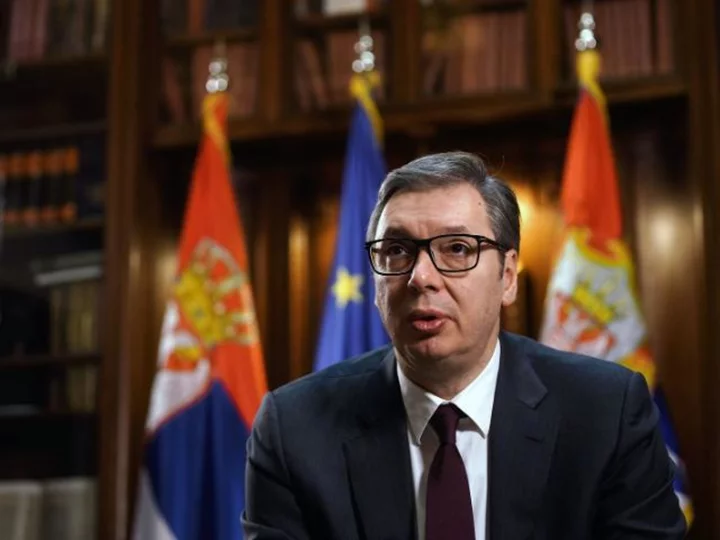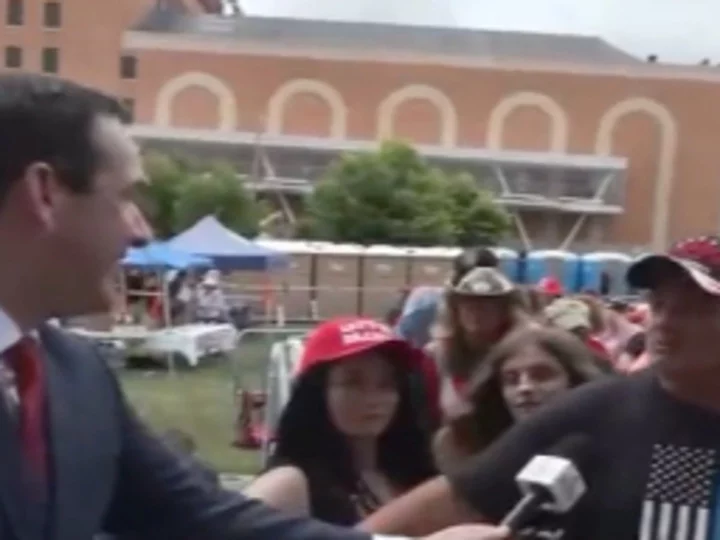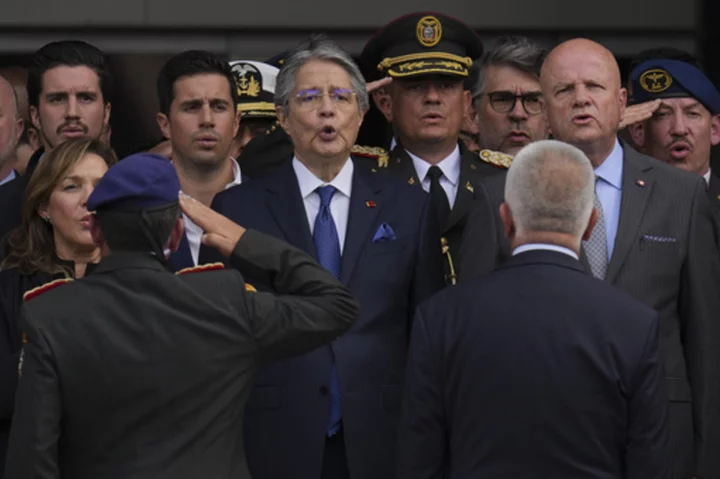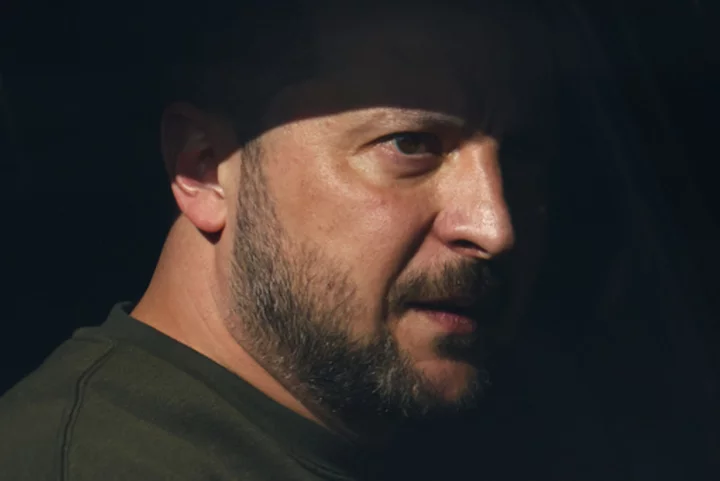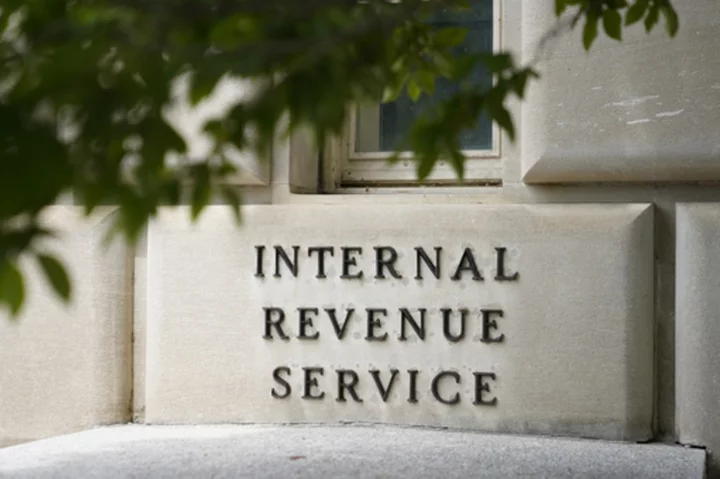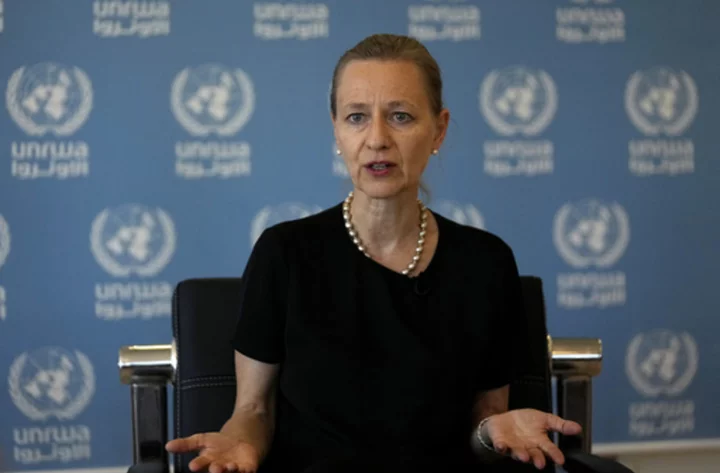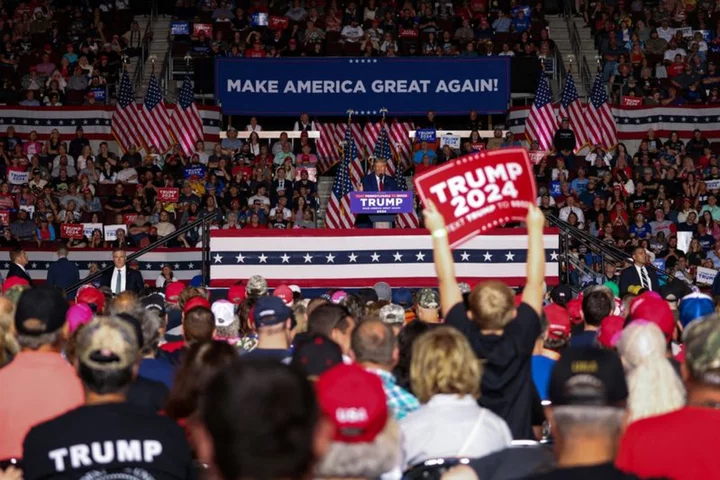When Russia invaded Ukraine, the United States and European Union accelerated their pivot towards Serbia. Rather than juggling the contradictory demands of pluralistic and fractious Balkan states, Western capitals focused the bulk of their efforts on a singular target.
Their policies had two aims. First, to bring Serbia into the Western fold, away from Russia. Second, to allow their respective administrations to focus more fully on supporting Ukraine.
Traditionally one of Moscow's closest allies in Europe, Belgrade has long tried to tread the line between its historical ties to Russia and a potential future of closer European integration. Western diplomats have sought to pull Serbian President Aleksandar Vucic from the orbit of his Russian counterpart, President Vladimir Putin, by pledging a swifter path to EU membership while simultaneously warning of isolation if they break rank.
But, 18 months on, some observers say the current approach has been all carrot and no stick, and as a result is failing to achieve both of its aims.
Serbia has refused to participate in all rounds of EU sanctions against Putin. And Serbia has continued to pursue its own interests in the region with diminishing accountability, stirring conflicts abroad to distract from discontent at home, safe in the knowledge they will not be rebuked in the West.
The effects of this have been felt most keenly in Kosovo, which achieved independence from Serbia in 2008, after the bloody Balkan wars of the 1990s. But Belgrade -- and many ethnic Serbs in Kosovo's north -- still refuse to recognize its sovereignty, straining relations between the neighbors.
CNN spoke with several experts, as well as locals in Serbia and the north of Kosovo, who are rankled by US and EU attempts to court Serbia into the Euro-Atlantic community, and contend that their continued pursuit of the policy risks alienating democratic allies and increasing security concerns in the region.
'A Russian Trojan horse'
Western governments have long treated Serbia as the indispensable Balkan voice, sometimes at the expense of more peripheral players, some observers say.
"Their belief is that Serbia is the Balkan state, as they see it. Serbia is the one that, if you can bring them on side -- whatever that might mean -- everything will be easier," Jasmin Mujanovic, a political scientist specializing in the Western Balkans, told CNN.
While consecutive US administrations have tried to bring Vucic and his Serbian Progressive Party (SNS) "in from the cold," these efforts "have become especially brazen" since the war began in Ukraine, Mujanovic said, and have not achieved the US' objectives.
"They seem to believe that they are bringing Serbia closer towards the EU and towards NATO and towards Western thinking and away from Russia... But that isn't something I would say is being reflected on the ground," Alicia Kearns, a British lawmaker and chair of the parliamentary Foreign Affairs Select Committee, told CNN.
Vucic has long maintained a cozy relationship with his Russian counterpart, Putin. Speaking after a National Security Council meeting in February, Vucic justified his decision not to sanction Russia because it was "the only country not to have imposed sanctions against us in the 1990s."
"They supported our territorial integrity in the United Nations," he added, referring to Russia's refusal to recognize Kosovo's independence. Serbia lost control of Kosovo after a NATO bombing campaign in 1999, which ended the massacre of ethnic Albanians -- who make up more than 90% of Kosovo's population -- by Serb forces.
Despite EU-supported efforts toward energy transition, Serbia remains heavily dependent on Russia, having sold a majority stake of its oil company to Russia state-owned giant Gazprom.
The result is that, despite Serbia's professed hopes to join the EU, Vucic has continued to walk a tightrope between Moscow and western powers. Though he has joined UN resolutions condemning Russia's invasion of Ukraine, Serbia's leader has shown little willingness to join western sanctions.
In April, the Serbian government denied reports that it sold weapons and ammunition to Ukraine, after a leaked Pentagon document emerged claiming otherwise. Serbia said at the time that it maintained its policy of neutrality, though some Western officials took the reports as proof that their policy was working.
Several analysts told CNN that Serbia has had to do very little to win praise from American and European officials, and that in reality Vucic has left a trail of broken promises.
"When we had his [Vucic's 2020] re-election, we were all told, just wait until after the election, you'll suddenly see that he becomes very Western- and European- oriented," said Kearns. "It didn't happen."
"We were told he would join sanctions and show that he is genuinely on our side. It didn't happen. We were told he wouldn't get closer to Russia. He signed a security agreement with Putin in September. Time after time, he laughs in the face of the West. And when I ask Western officials, 'why are you so determined to let Vucic play you?' they say he is the best option," said Kearns.
Kearns has been one of the few Western figures to criticize Serbia publicly. But it has come at a cost. After she spoke to CNN, Vucic issued an apparent threat to her during an address on state television, claiming that "if the government of Great Britian is not willing to react" to her criticisms of Serbia, "We will be forced to react."
Given such behavior, some question whether the whole project of Serbian integration is viable, under its current government.
"Assuming we somehow miraculously bring Serbia into the EU, with this sort of regime, you are practically bringing another Russian Trojan horse into the EU, like you have in the shape of [Hungarian Prime Minister Viktor] Orban," Majda Ruge, a Balkan expert at the European Council on Foreign Relations, told CNN.
"Yes, you may affect enlargement, but you're certainly not going to neutralize Russian influence in the region -- you're just going to import it into the EU."
Kosovo and the rule of law
The effects of the West's forgiving approach to Belgrade are felt most keenly in Kosovo, which has depended on Western support since declaring independence. While more than 100 countries recognize its sovereignty, Serbia does not, viewing it instead as a breakaway state. Attempts to normalize relations between the two countries -- overseen by the US and EU -- have been fraught and occasionally violent.
The fiercest flashpoint came after mayoral elections Kosovo's four northern municipalities in May. These elections often pass without fanfare: Around 90% of the population in this region are ethnic Serbs, and so, under ordinary circumstances, they elect ethnic Serbs as their mayors.
But these were not ordinary circumstances. In November, mayors from the Belgrade-backed Serb List party, which dominates the four municipalities, simultaneously resigned. They were followed by ethnic Serb police officers, administrative staff and judges in the region.
Their resignations triggered new elections, due to be held in December. Serb List said it would not participate in the elections, after Serbs in the region boycotted them, with Vucic's full support. But, given the tensions, Kosovo agreed to postpone the elections until April -- a decision that was praised by the Quint, an informal group comprising the US, UK, France, Germany and Italy.
With Kosovo Serbs not participating, ethnic Albanian candidates ran unchallenged. Election officials said only around 1,500 people voted across the four municipalities -- a turnout of just 3.5%. Some mayors were elected with scarcely more than 100 votes.
But while the elections were by no means representative, for Kosovo's Prime Minister Albin Kurti, the issue had come to represent nothing less than the rule of law itself.
"We have four mayors whose legitimacy is low. But, nonetheless, there is no one who is more legitimate than them. We have to have the rule of law. We are a democratic republic," Kurti told CNN in May.
However, the prime minister's stance has been criticized as hardline and uncompromising. His allies accused him of forcing entry to the mayor's offices on May 26, when many were surrounded by protesters, against explicit instructions.
"The US did tell Kurti -- and this is where he's at fault -- they told him not to install them in the municipal buildings. And this is where Kurti ignored the specific direction," said Edward Joseph, a foreign policy lecturer at Johns Hopkins University who served for a dozen years in the Balkans, including with NATO.
A Pristina government official told CNN that they did not want to "surrender" official government buildings to protesters. "The mayors entered their offices... Serbia had urged Serbs to boycott the elections. Now they wanted no one to enter those buildings. But then, the question is: If the mayors should not enter the building, who should?"
But while Kurti may have taken an uncoordinated action, the response to this was not inevitable. The worst of the violence came not on the day the mayors entered their offices, but three days later, in the town of Zvecan -- when the mayor was not even in the building.
The violence was extreme. Dozens of NATO peacekeepers were injured after they were attacked by ethnic Serbs. Some injuries were severe: Three Hungarian soldiers were shot; one had his leg amputated.
Kurti told CNN these were not "peaceful protesters," but a "fascist militia" known to operate in Kosovo's north, "who are being paid and ordered by Belgrade."
The Serbian government did not respond to multiple requests for comment.
Others agree with Kurti. Kearns told CNN that British troops stationed in Kosovo had found "weapons caches hidden in churches and ambulances by Serb militia in the north of Kosovo. We heard about grenades outside people's doorsteps if they refuse to support Serb militia."
Despite this, much of the diplomatic response has focused on Kurti's actions, for which Kosovo has paid a heavy price. Since the fallout from the elections, Kosovo has been disinvited from joint military exercises with the US, excluded from European infrastructure projects and slapped with sanctions that the Kosovar Business Alliance says could cost its economy €500 million ($550 million) by the end of this year.
Kearns criticized the "unbalanced" response from the West, saying it ignored the true cause of the troubles. "The start of the crisis was the Serbian government committing foreign interference in domestic Kosovar affairs, where they told Kosovar Serbs not to vote in the local elections. That is foreign interference," she said.
Kurti has tried to proclaim Kosovo's sovereignty against the twin forces of foreign interference and organized violence, to which, according to Mujanovic, the US and EU have responded: "No. That is not appropriate in these circumstances."
'The Zelensky of the Balkans'
Given Kosovo's reliance on Western backing, some fear Kurti's intransigence is frustrating his allies and weakening his country. Some are calling for a complete change of tack.
"He's trying to be the Zelensky of the Balkans," Shqiprim Arifi, mayor of the southern Serbian region of Presevo, told CNN. "He is using rhetorically, and in a populist way, the argumentation of the rule of law. He wants to be the Zelensky of the Albanians."
Serbia's Presevo Valley represents the flipside of the north of Kosovo. Whereas Kosovo's north is populated mostly by ethnic Serbs in an Albanian-majority country, the Presevo Valley is populated mostly by ethnic Albanians in a Serb-majority country.
The best way to improve the situation, Arifi said, is for Kurti to do as Western allies demand: Work to create as "Association of Serb Municipalities" (ASM) in the north of Kosovo.
Kurti has been accused of preventing the implementation of self-governing municipalities for Serbs, as outlined in the 2013 Brussels Agreement aimed at normalizing relations between the Balkan neighbors. Under the agreement, Serbia could create the ASM in northern Kosovo, which would operate under Kosovo's legal system, with Kosovar police remaining the only law enforcement authority.
A decade on, these municipalities have not been created, leaving disputes to fester over the degree of autonomy for Kosovo Serbs.
But there are doubts as to whether this solution -- now being forcefully pushed by the US and EU -- will ease tensions.
"Trust me, it won't be the best solution," Dusan, a Serb living in Leposavic municipality, told CNN. "Maybe, in the first couple of months, it will be a relief. Maybe, 'Oh look, we finally got something."
But it would be a false dawn. "From an economic aspect, our lives will not be improved, but it will be worse," he said, since residents would have to start paying for services and taxes currently covered by Kosovo's government. CNN is withholding Dusan's real name, since he feared that his comments could affect his livelihood.
There are also concerns that the ASM could beckon more geopolitical tensions.
"We don't know what these municipalities will be," said Kearns. "Will it just be that the local municipalities are responsible for their own water and electricity and taxes? Or is it that it is going to be a new Republika Srpska? The reality is, I don't think anyone wants another Republika Srpska."
Republika Srpska, one of the two entities comprising Bosnia and Herzegovina, proclaimed independence in 1992 and was formally recognized under the Dayton Agreement of 1995. In recent months, its pro-Russian President Milorad Dodik has tried to pave the way for its secession from Bosnia.
In June, Republika Srpska lawmakers voted to suspend rulings by Bosnia's constitutional court, in a move described by experts as "legal secession" and a grave contravention of the Dayton Agreement. The US condemned the move, saying it threatened Bosnia's sovereignty.
"The folks in Pristina and Kurti have made it very, very clear that they see in the autonomous municipalities a new Republika Srpska. And they don't see in that model a solution for Kosovo. They see a new version, a new generation of crisis for Kosovo, and ultimately the region as a whole," said Mujanovic.
The wrong horse?
Throughout the recent months of tensions, the US and EU have continually reiterated their commitment to the cause of bringing Vucic on side. But Serbia has acted with increasing abandon, representing what Kearns called "a failure of deterrence diplomacy."
One damaging episode came in Ohrid, North Macedonia, in March when, after months of negotiations brokered by the US and EU, Serbia and Kosovo finally accepted a bilateral agreement aimed at normalizing relations between the two countries. But, while this was heralded as a breakthrough, Vucic left the negotiations without having signed the document, claiming in a TV address that he was unable to do so: "I have excruciating pain in my right hand... that pain is expected to continue for four years."
Another came when Serbian authorities detained three Kosovo police officers, which it claimed were "deep inside the territory of central Serbia" and preparing to commit "an act of terrorism." But Kosovo insisted that the officers had been "kidnapped" within Kosovo's borders and that Serbia had committed and "act of aggression."
The US and EU were slow to respond to this incident. KFOR, NATO's Kosovo Force, issued a statement 48 hours after the officers were reported missing. The US issued a statement three days later, claiming that the arrests were made on "spurious charges."
Joseph told CNN that the Serbian account of events was hard to believe -- and that the wording of the US statement suggested their officials likely weren't buying it, either. "If the US were genuinely unsure about whether the Kosovo police were in Serbia, then why use such a categorical term [as "spurious"], which pre-empts the purview and judgement of the Serbian court?"
And yet Serbia was not punished for the detentions. The officers' release was secured two weeks later -- not by Western allies, but by Viktor Oban.
After such episodes, Joseph told CNN that the "see no evil" approach to Vucic's regime may be starting to crack.
"The question here is: Who in the Biden administration still believes that Vucic is this partner?" he said, pointing to the recent sanctioning of Aleksandar Vulin, director of Serbia's intelligence service, as evidence that the Biden administration "is no longer captive to fear and illusion about Vucic."
But whether this translates into a change of policy is unclear.
In the meantime, Vucic has raised the stakes. In response to the sanctioning of Vulin, Vucic banned arms exports from Serbia for 30 days, claiming "everything must be prepared in case of aggression against the Republic of Serbia."
"He's basically saying 'we're going to go into conflict, we have to stop all of the weapon exports right now, because we need it for our national security.' He's literally threatening war. I've never seen him so explicit before," said Ruge of the ECFR.
And the president's message has been taken up by some Serbian citizens. At Red Star Belgrade soccer match last month, nationalist Serb fans held up a banner reading "When the army returns to Kosovo." Vucic attended the match, according to local media.
"The situation is clear who the bully of the Balkans still is," Meliza Haradinaj, Kosovo's former foreign minister, told CNN. "Time will prove that this 'investment' of appeasing Serbia will go in vain."

